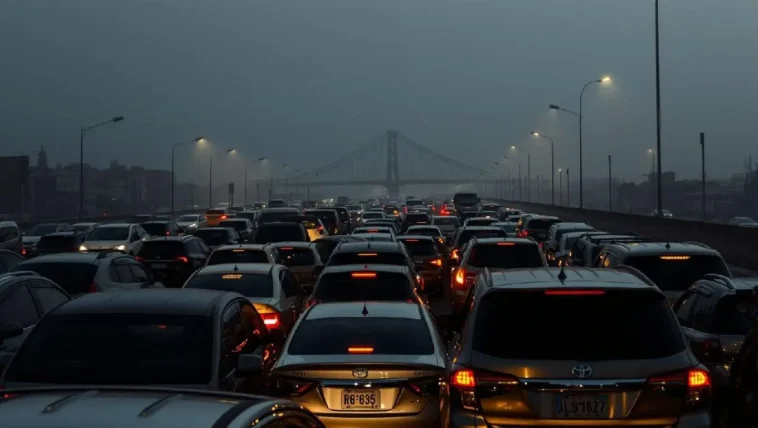Lagos Independence Bridge Traffic
Lagos Bridge Closure: Traffic Chaos & Alternative Routes
Lagos Independence Bridge Traffic is causing major delays across the city, impacting businesses and commuters alike.Lagos Independence Bridge Closure: A Commuter’s Nightmare Unfolds on the Roads
For Lagosians, traffic is a part of life, an unwelcome companion on the daily grind. But on April 1, 2025, something shifted. The usual snarl transformed into a monstrous gridlock, a city-wide standstill triggered by the abrupt closure of the Independence Bridge. What was meant to be a temporary inconvenience for essential repairs quickly spiraled into a full-blown crisis, leaving commuters stranded and businesses reeling. The chaos wasn’t just about lost time; it was about lost opportunities, frayed nerves, and a city brought to its knees.
Olukorede Kesha’s Announcement: Words vs. Reality on the Streets of Lagos
Olukorede Kesha, the Federal Controller of Works in Lagos, delivered the official word: the Independence Bridge would be closed until the end of May for urgent maintenance. The intention, she stressed, was to ensure the safety and stability of this vital infrastructure. But as Kesha spoke of necessary precautions, the reality on the ground was far more visceral. Commuters weren’t thinking about structural integrity; they were battling to get home, to work, to their families. The disconnect between the official narrative and the lived experience fueled the growing sense of frustration and anger.
The announcement, while intended to provide clarity, instead ignited a firestorm of criticism. Many questioned the timing, the lack of sufficient advance notice, and the apparent absence of a comprehensive traffic management plan. It felt as if the government was addressing the symptoms while ignoring the underlying disease of Lagos’s overburdened infrastructure.
The promise of safety rang hollow for those trapped in hours-long queues, their cars inching forward at a snail’s pace. The closure, intended to prevent disaster, ironically created a different kind of emergency – a logistical nightmare that threatened to paralyze the city.
Alternative Routes: A Mirage in the Lagos Metropolis?
The Lagos State Government, in its attempt to mitigate the impact, offered a list of alternative routes. Ahmadu Bello Way to Victoria Island? Try Ozumba Mbadiwe Avenue. Ahmadu Bello Way to the Third Mainland Bridge? Alfred Rewane Road was the supposed answer. But these alternatives quickly proved to be a mirage. Instead of easing the congestion, they simply shifted the bottleneck, creating new pockets of gridlock across the city.
Ozumba Mbadiwe Avenue, Falomo Roundabout, Alfred Rewane Road – these names became synonymous with frustration, each intersection a battleground for space and time. The alternative routes, designed to provide relief, instead became extensions of the original problem, amplifying the chaos and leaving commuters feeling utterly helpless.
It was a classic case of unintended consequences. The government’s attempt to provide solutions backfired, exacerbating the already dire situation and highlighting the limitations of Lagos’s existing road network.
Eight Hours and Counting: Personal Hell in the Lagos Gridlock
Imagine sitting in your car, the minutes turning into hours, the sun beating down, and the traffic showing no signs of easing. This was the reality for countless Lagosians during the Independence Bridge closure. Stories emerged of commuters stranded for eight hours or more, some forced to spend the night at their workplaces, dreading the thought of facing the same ordeal the next day.
These weren’t just statistics; they were real people with real lives disrupted. Parents missed their children’s bedtime, employees were late for crucial meetings, and businesses suffered from reduced productivity. The traffic wasn’t just an inconvenience; it was a personal hell, a daily reminder of the city’s infrastructural challenges.
One commuter, recounting her experience to Naija NewsBurrow Network, described the scene as “apocalyptic,” with cars overheating, tempers flaring, and a general sense of despair permeating the air. It was a stark reminder that behind every traffic jam, there are individual stories of struggle and resilience.
Ferry Services: A Glimmer of Hope on Lagos Waterways
In the face of the road chaos, many Lagosians turned to the waterways, seeking refuge in the city’s often-underutilized ferry services. What was once a niche mode of transport suddenly became a lifeline, offering a faster, albeit more expensive, alternative to the gridlocked roads. The surge in demand highlighted the potential of water transport in Lagos, a city surrounded by lagoons and waterways.
Ferries became packed, lines grew longer, and the once-peaceful waterways buzzed with activity. It was a clear indication that Lagosians were desperate for solutions, willing to explore alternative modes of transport to escape the traffic nightmare. The increased reliance on ferries also exposed the need for greater investment in this sector, with calls for more boats, improved terminals, and better integration with the city’s overall transport network.
The waterways offered a glimmer of hope, a reminder that Lagos has untapped potential to alleviate its transport woes. But it also underscored the need for a more holistic approach, one that embraces multimodal solutions and prioritizes sustainable urban mobility.
Social Media Meltdown: Lagosians Unleash Their Fury
Social media became the digital battleground for frustrated Lagosians. Platforms like Twitter, Instagram, and Facebook were flooded with complaints, memes, and videos capturing the absurdity of the traffic situation. The hashtag #LagosTraffic became a rallying cry for those seeking to vent their anger and share their experiences. The digital fury was palpable, a clear indication of the public’s dissatisfaction with the government’s handling of the crisis.
Memes poked fun at the seemingly endless gridlock, videos showed cars bumper-to-bumper for miles, and comments expressed a mixture of anger, resignation, and dark humor. Social media became a powerful tool for holding the government accountable, amplifying the voices of ordinary citizens and demanding action.
The online outcry served as a wake-up call, forcing authorities to acknowledge the severity of the situation and respond to the growing public pressure. It was a reminder that in the digital age, governments can no longer afford to ignore the collective voice of their citizens.
Sanwo-Olu and Umahi’s Apologies: Empty Words or Genuine Contrition?
In response to the mounting public pressure, both Lagos State Governor Babajide Sanwo-Olu and Federal Minister of Works David Umahi issued apologies. Sanwo-Olu expressed empathy for the hardships endured by residents, while Umahi ordered the immediate reopening of the Independence Bridge. But were these apologies genuine expressions of contrition, or simply empty words designed to appease the masses?
For many Lagosians, the apologies rang hollow. The bridge remained closed despite Umahi’s order, and the traffic chaos persisted. It felt as if the government was more concerned with managing public perception than with addressing the root causes of the problem. The skepticism was understandable, given the history of unfulfilled promises and infrastructural neglect in Lagos.
The apologies, while perhaps well-intentioned, failed to quell the anger and frustration. What Lagosians wanted was not just words, but concrete action – a clear plan for resolving the traffic crisis and preventing similar incidents in the future.
Businesses in the Red: The Economic Cost of Gridlock
The Independence Bridge closure wasn’t just a commuter’s nightmare; it was an economic blow to businesses in Lagos. Companies reported reduced patronage, logistical challenges, and significant financial losses. The traffic congestion made it difficult for customers to reach shops and offices, and the delays disrupted supply chains, impacting everything from deliveries to meetings.
Small businesses, already struggling to survive in a challenging economic climate, were particularly vulnerable. The traffic chaos further eroded their bottom lines, forcing some to consider layoffs or even closure. The economic impact extended beyond the immediate vicinity of the bridge, affecting businesses across Lagos Island and beyond.
The crisis underscored the importance of efficient transportation for economic growth. When traffic grinds to a halt, businesses suffer, jobs are lost, and the overall economy takes a hit. It’s a reminder that investing in infrastructure is not just about convenience; it’s about creating a thriving and sustainable economy.
Beyond the Bridge: A Deeper Look at Lagos’s Transport Woes
The Independence Bridge closure was merely a symptom of a larger problem: the systemic issues plaguing Lagos’s transport infrastructure. Decades of neglect, poor planning, and inadequate investment have left the city struggling to cope with its ever-growing population. The lack of a comprehensive transport strategy, the over-reliance on roads, and the failure to integrate different modes of transport have created a recipe for disaster.
Lagos needs a bold vision for the future, one that prioritizes sustainable urban mobility and embraces innovative solutions. This includes investing in public transport, expanding the ferry network, improving traffic management, and promoting cycling and pedestrian-friendly infrastructure. It also requires a shift in mindset, from viewing transport as a problem to seeing it as an opportunity to create a more livable and prosperous city.
The Independence Bridge crisis should serve as a wake-up call, a catalyst for change. It’s time for Lagos to break free from its traffic-choked past and embrace a future where mobility is a right, not a daily struggle.
Lessons Learned: Charting a Course for a Traffic-Free Lagos
The Independence Bridge saga offers valuable lessons for Lagos and other rapidly growing cities facing similar challenges. Timely communication, robust alternative transport planning, and the integration of water and road transport are essential for mitigating the impact of major infrastructure projects. But beyond these immediate measures, there’s a need for a more fundamental shift in approach.
Lagos needs to prioritize preventive maintenance, investing in regular inspections and repairs to avoid sudden closures and disruptions. It needs to embrace technology, using data analytics and smart traffic management systems to optimize traffic flow and reduce congestion. And it needs to engage with citizens, involving them in the planning process and ensuring that their voices are heard.
The dream of a traffic-free Lagos may seem utopian, but it’s not unattainable. With vision, leadership, and a commitment to innovation, Lagos can transform its transport system and create a city where people can move freely, businesses can thrive, and life is no longer defined by the daily grind of traffic.
Funmi Aiyelomo (@FunmiAiyeUpdates) reporting for Naija NewsBurrow Network.
Navigating Lagos traffic can often feel like a Herculean task, even on the best of days. But with the Independence Bridge closure, the challenge has been amplified tenfold, turning daily commutes into grueling endurance tests. In such circumstances, having the right tools at your disposal isn’t just a luxury; it’s a necessity. From real-time traffic updates to alternative route suggestions, technology can be a lifesaver amidst the chaos.
Imagine being able to anticipate bottlenecks, reroute on the fly, and avoid the worst of the gridlock. With the right GPS navigation system, this becomes a reality. These devices offer more than just directions; they provide up-to-the-minute traffic information, helping you make informed decisions and stay one step ahead of the congestion. Whether you’re a seasoned Lagos driver or a newcomer to the city, a reliable GPS can be your best ally on the road. Ready to transform your commute from a nightmare into a manageable journey? Explore our curated selection of GPS navigation systems designed to conquer Lagos traffic. Share your own traffic survival tips in the comments below and subscribe to the Naija NewsBurrow newsletter for more updates and insights!
Shop Products On Amazon
Shop Products on Ebay

Trending Similar Stories in the News
Plan your movement: Lagos issues alert on Independence Bridge traffic chaos MSN...
Lagos at standstill as Independence bridge repairs begin Businessday NG...
Trending Videos of Lagos Independence Bridge Traffic
Lagosians Spend 8 Hours In Traffic After Bridge Closure
Similar Popular Articles
#LagosTraffic #NigeriaTraffic #IndependenceBridge #Lagos #Gridlock
Lagos Traffic, Independence Bridge, Road Closure, Gridlock, Commuters






💬 What’s your take? Drop a comment below! ⬇️
#BreakingNews #LatestUpdate #StayInformed
📖 Read More: https://honeydew-zebra-306959.hostingersite.com/lagos-independence-bridge-traffic-chaos/
Lagos Bridge Closure: Traffic Chaos & Alternative Routes
💬 What’s your take? Drop a comment below! ⬇️
#BreakingNews #LatestUpdate #StayInformed
📖 Read More: https://tinyurl.com/yvtlnon9